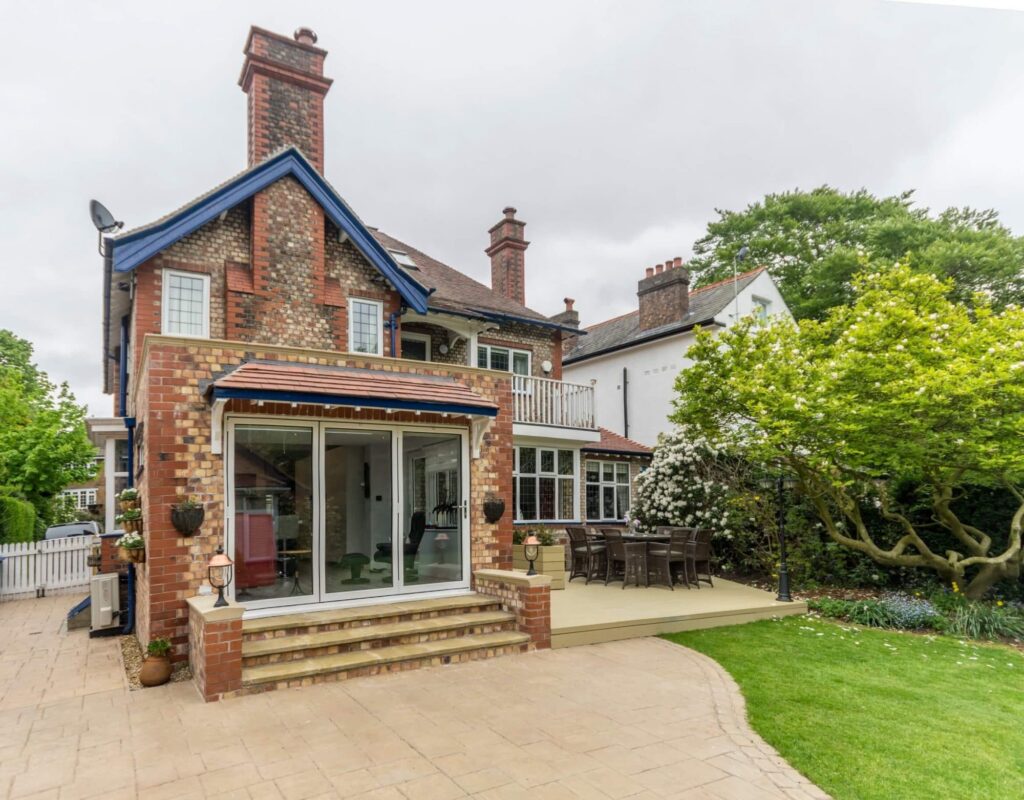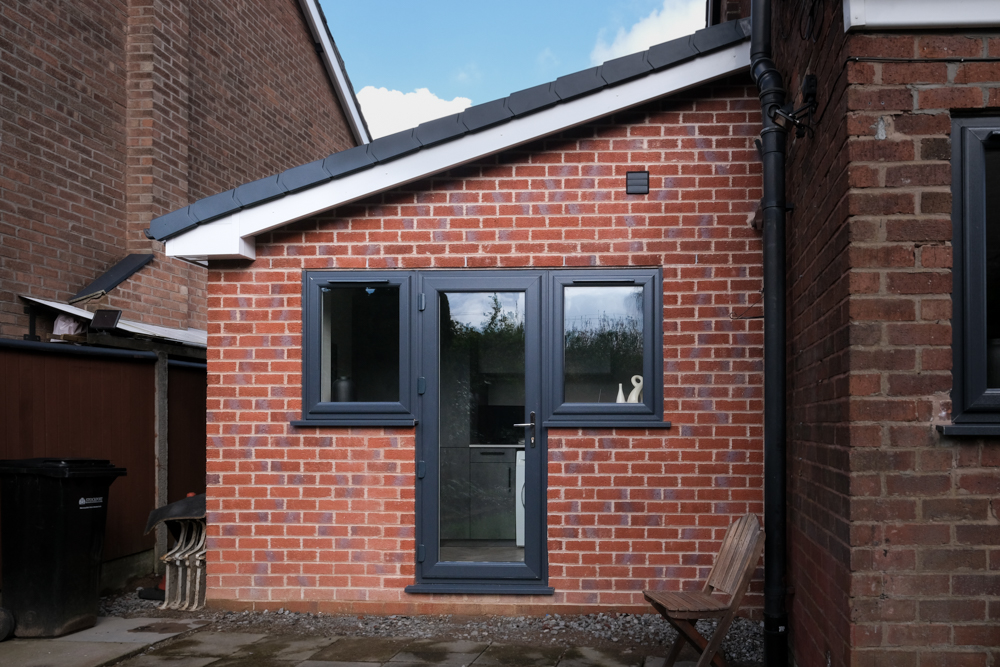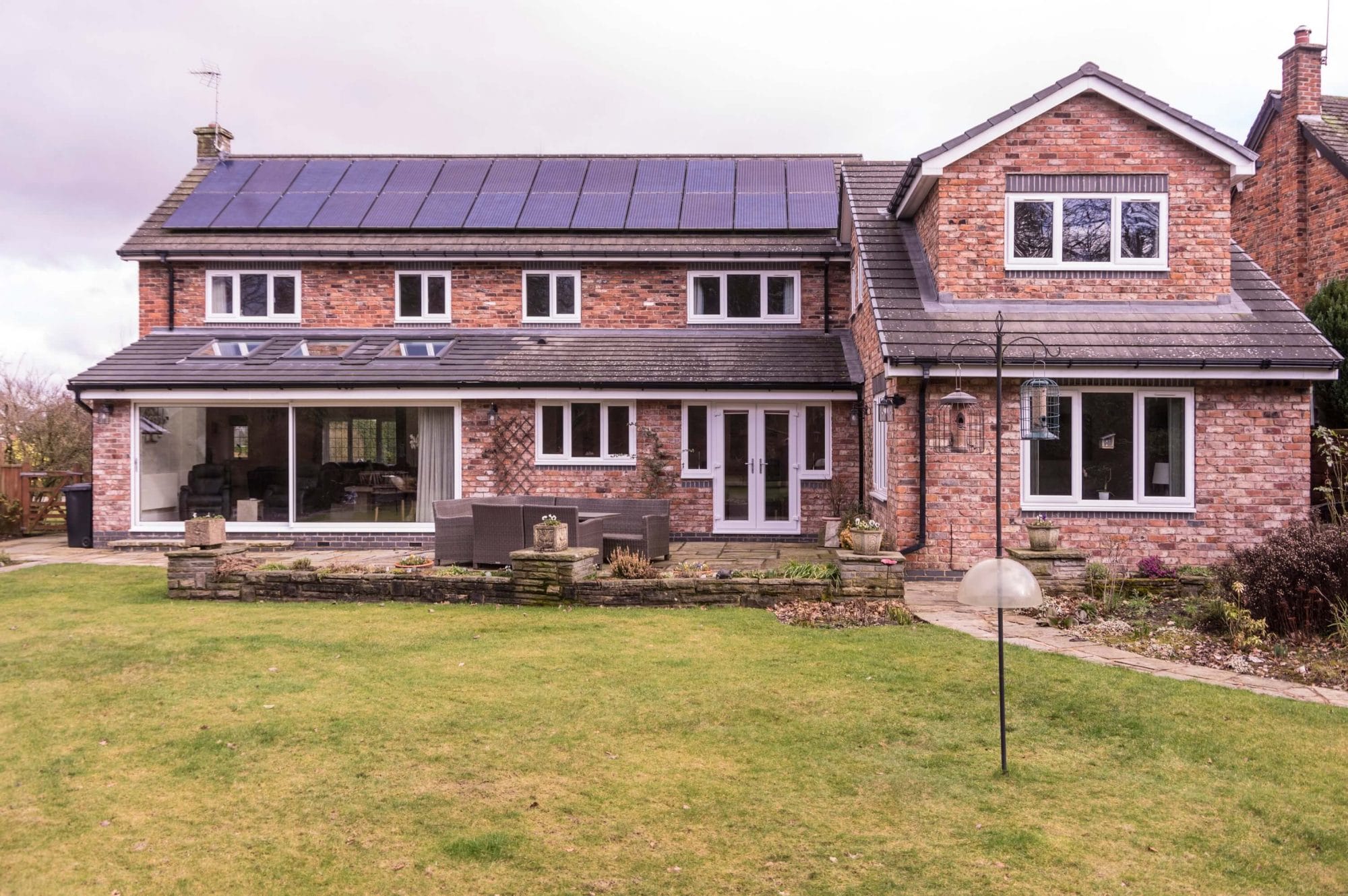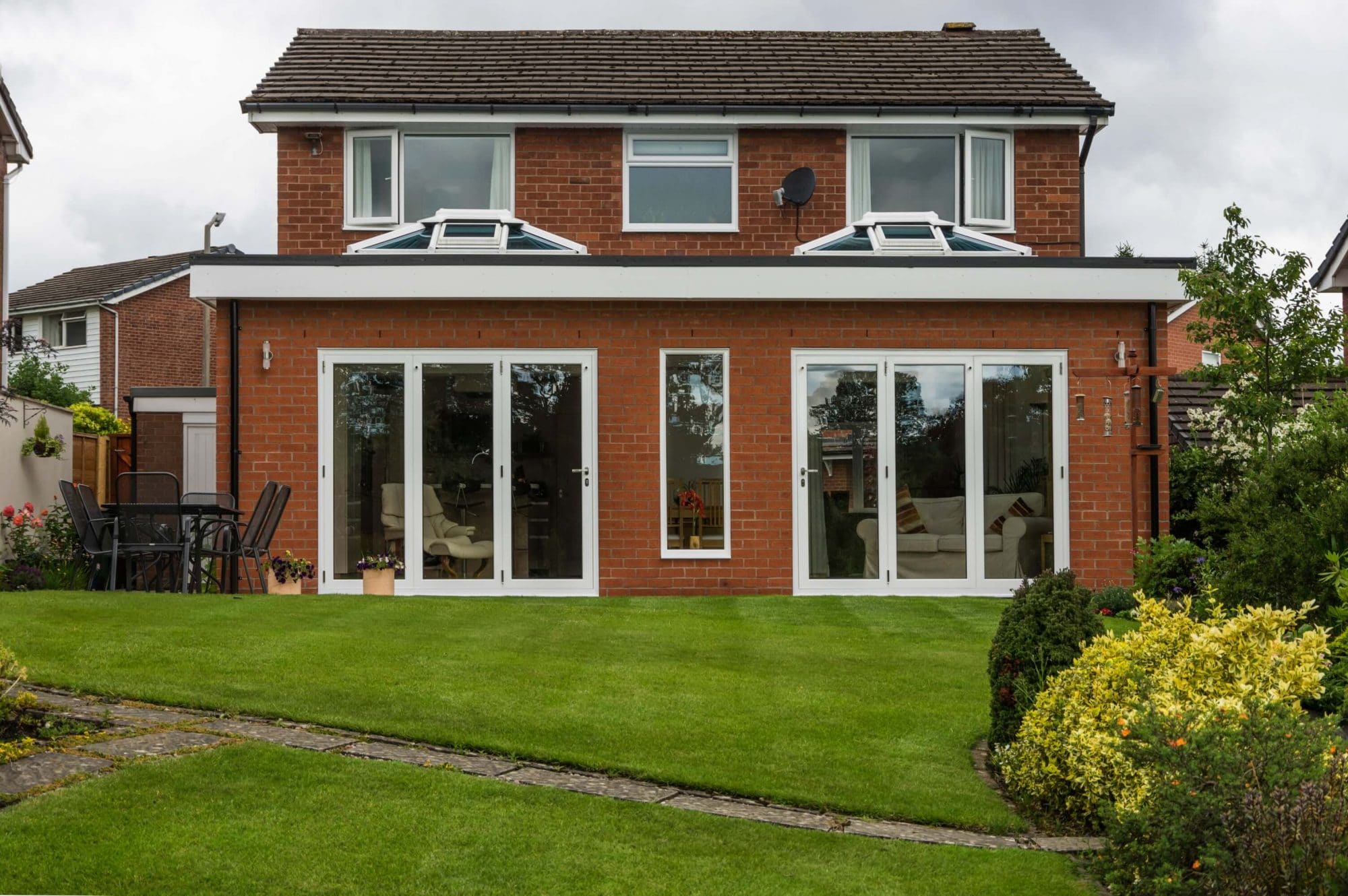We take care of your build
If so, you’ll be in safe hands with Adamson’s. Got a question, want an idea of price or ready to book your FREE home design visit?
Home extensions are an excellent way to make your current home work better for you and your family, but determining the cost of a house extension can be a bit of a minefield. It turns into a ‘how long is a piece of string’ style question with a myriad of factors influencing how much you may need to for your home extension budget before you go ahead with the project.
Not to worry though, we’ve been building all manner of house extensions across Manchester and Cheshire for the last 40 years, so we know our stuff. Here’s our complete guide to understanding how much your home extension will cost.
It’s obvious, but the impact of size on your extensions cost is significant – the larger your extension, the more expensive it will be. A larger space will need more materials, more labour and more time to complete, nudging the final cost up. In this case, it is essential to consider the return on investment you’ll get from the additional space, not just in terms of finances but also in the day to day functionality of your home.
Focus on the most essential parts of your home renovation and how they will change your life. Do some experimental work with layout and design to maximise the use of your new space, whatever size it may be.

There are a number of different extensions you can add to your home, each with different benefits and costs.
Single storey extensions are one of the most popular choices for UK homeowners. They can provide a lot of additional space and functionality to a home and be a cost effective alternative to moving house. There are a few options:
1. Side Extensions
Many UK homes (particularly those built in the Victorian era) are built with a path running down the side of the building to give separate access to the garden; for many, this is often unused or unnecessary for their lifestyle. Utilising the side access path for a side extension is a much better solution that can resolve various space and functionality issues within the home. Plus, the cost of a side extension can be relatively affordable, and these projects sometimes don’t even require planning permission!
Over the years, many of the side extensions we have built have been transformed into downstairs WCs, separate utility rooms, or simply added much-needed space to an existing room, typically the kitchen.

2. Rear Extensions
For those fortunate enough to have an extensive garden, extending out towards the rear is often the go-to option. Rear extensions are typically where we see the larger single-story extensions being constructed, as homeowners, depending on planning permission, can extend as far as 8 meters. The cost of a rear extension can vary, but it generally offers excellent value for the significant additional space it provides, bringing about a total transformation.
If you’re looking at a double-story extension, the rear extension can also be expanded vertically, although this will significantly impact the overall cost due to the additional structural work required. More on that below.
It’s tricky to pin point the average price of a rear extension as they can drastically vary in size and features but from our research and catalogue of past customers, we’ve found that you can expect to spend anywhere from £40,000 to £150,000.

3.Wrap Around Extensions
Now, if you’re really looking to change your home and are in need of a lot more square footage and potentially a number of new rooms (children’s playroom, home office, utility, another bathroom or bedroom etc) a wraparound extension offers the best addition to your existing home. Combining both the side and rear extension, a wraparound does just that—wraps around your home to add additional space on multiple sides.
However, because they are so extensive, planning permissions are a little bit different. When putting in your application, you will need to request development for both a side and rear extension individually which can mean that it’s unlikely that your project will fall under your permitted development rights.
Given the size, amount of materials, and labour involved, wraparound extensions are typically the most expensive of the single-story extension options, but, of course, the cost of a wraparound extension depends on how far you’re extending and what you want to include within your new space.
Several factors can influence the cost of a wraparound extension: whether or not you’ll need to remove a load-bearing wall, the type of property it is, and the new rooms that will come as part of the project. On average, we’ve found that for a single-story wraparound extension, you can expect to pay between £1,500 to £3,500 per square meter.
For more space on two floors of your home, a double storey extension is the solution. Homeowners typically opt for them to add on additional bedrooms and/or bathrooms to their homes.
While you may be spending more on labour and materials overall by having a double storey extension, you’re likely to save more money in terms of the roof and foundations of you’re extension by doing them together in one go. Many homeowners will opt to do a single storey extension first and then revisit it in future to extend upwards, but if you can afford to do it as one initial project you could be saving yourself money overall plus, the headache of disruptive construction work only happens once!
The average cost of a double storey side extension in 2024 is between £80,000 and £150,000.
Dormer or Loft Extensions
A loft conversion or extension can be a great way to better utilise dead space within your home. Instead of storing your Christmas tree up there for 11 months of the year, you could be benefitting from extra bedrooms and bathrooms. With the way UK homes have been designed historically, loft extensions are one of the most common extensions that homeowners opt for as they can be an effective solution to storage and functionality dilemmas.
Sometimes it can be as simple as just converting the existing loft space with a fresh coat of plaster, paint and new flooring but for some, it can be more complex, requiring construction to raise the ceiling height and change the pitch of the ceiling so it becomes a much more useable space.
Alternatively, adding in a dormer to a roof can provide headroom and the option to add in new windows to bring in more natural light. These can be an affordable option as opposed to a full on loft extension which would require a new roof.
Unsurprisingly, these variations make it difficult to offer a general cost but we’ve found that it can be anything from £60,000 to as much as £200,000.
One way to save money on any kind of extension is to shop around for different materials at every stage. Whether that’s the bricks and mortar itself or the new kitchen units that will eventually go in, it can be possible to cut down the price by doing some research.

For low cost options, consider off the shelf solutions for items such as plasterboards, windows and doors instead of opting for bespoke solutions which can drive the prices up.
Simplistic room shapes such as squares and rectangles can keep the price of a project lower as they’re more standardised and so can be undertaken by a wider range of tradespeople who can provide quotes for you to pick from.
On the flip side, if you’re really wanting to invest and make your extension the highest quality it can possibly be, going with higher quality items and top of the range products may be the choice for you. We typically see this happening for homeowners who have no plans of moving and want to enjoy their home for the rest of their lives.
As with everything in the UK, costs can vary depending on where you live. Home extensions are no exception to this. Of course if you’re in London, you can expect to pay the highest rates of all with the average asking price per square metre being in excess of £5,000 compared to the UK average of just £2,954 per square meter.
That’s a vast difference for those in the capital to budget for compared to elsewhere.
Comparatively, the cheapest area to get a home extension is Sunderland at just £1,417 per square meter.
In Manchester and Cheshire, extension costs per square metre can be anywhere from £1,500 for a budget solution up to £3,000 for a high-end solution.
With that in mind, let’s dive into…
But before we start, the issue with pricing up an extension is that it is so unique to each home and each homeowner. It can feel frustrating to be doing research to find a straight answer and just get a number so you know what to expect, we’ve done our best to try and give you some clear guidance on costs for labour, materials and so on.
Side/Rear:
Small (30m2) £45,000 – £100,000
Medium (45m2) £60,000 – £130,000
Large (60m2) £80,000 – £180,000
Wrap Around:
Small (30m2) £45,000 – £100,000
Medium (45m2) £70,000 – £130,000
Large (60m2) £80,000 – £180,000
£60,000 – £180,000
It’s also important to consider the types of new rooms that are being created as these can vary in price quite significantly too:
With any home renovation project, extra costs are bound to pop up here and there. Whether that’s a change of heart about the cabinet handles you’ve chosen or something more serious like unexpected pipework issues, here are some of the common costs we come across during our house extension projects.
You’ll be aware that planning permission and building regulations are a part of the admin side of your home extension, but these costs can vary and if you’re not aware of them before you start shopping around, it can be a nasty shock when you’re hit with them. Depending on your home, the size of the extension and your local authority you can expect to pay anywhere from £180 to £250.
Some construction companies will offer to include this as part of your total project fee which can be a great option if you’re not a fan of admin work or find it overwhelming. Knowing that an expert who has likely dealt with your local authority before, and is confident in filling out the paperwork has it all in hand can be a huge weight off your shoulders, leaving you to focus on the fun aspects of your project like picking out tiles or furniture.
If your project is going to affect any part of your neighbours property including outbuildings and their property boundary, you’ll need to have a party wall agreement in place. Sometimes this can be managed yourself by simply having a chat with your neighbour then issuing notice in writing a minimum of two months prior to the building work beginning. If your neighbour gives their consent in writing within 14 days of you issuing it, the project is fine to go ahead.
However, if this isn’t the case, you may need to start considering external support to negotiate the project. Your neighbour has the right to refuse consent and/or serve a counter notice to request that additional works are done at the same time.
If you and your neighbour(s) can’t come to an agreement, a surveyor will need to be appointed to agree on a party wall award.
So, how much does it cost to get your party wall notice? Surveyors charge anywhere from £80 to £300 per hour, so it can start to add up if the dispute is ongoing for a long time.
Consider this as part of your budget – hopefully you won’t need it, but it’s good to have in mind just in case.
Once your project is ready to begin, the first stage of construction will be the groundworks. More than just the foundations of your build, the groundworks also address any pipework, drainage, tree removal, paths and patios attached to your property etc.
These works are crucial to get right, this is absolutely an element of the project that you don’t want to scrimp and save on.
Groundwork teams will typically be subcontracted by a construction company and be on site for about 2 weeks at the very start of your project. You can expect to pay anywhere between £80 and £300 per day, so not an insignificant sum at all.
An often forgotten about element of building a new extension is the insurance you have on your home. It’s essential that you notify your insurance company of the works planed/completed in case it impacts your premiums and cover.

Budgeting for a home extension can be tricky. It’s difficult to know just how much to set aside as each project is so unique. We always advise that you be flexible with your budget and also your vision so that you can achieve an extension that not only provides all the home improvements you’re looking for, but doesn’t leave you financially scolded.
To get a full overview of the cost, an architectural designer or construction firm is your safest bet. An experienced company will have built many extensions before and be able to offer a realistic quote based on your vision.
It’s worth shopping around for different offers as some may be more comprehensive than others. One company may offer to do it all for you and include that in their price another may do only the construction elements, leaving you with the admin.
If you’re keen to save money, the latter option may be best, but we’ve often seen the stress and hassle of juggling all the paperwork, navigating legislation and regulations makes an already stressful project, much worse.
Planning a home extension requires careful consideration of many factors which can significantly impact the overall cost of the project. The size and scope of a project can have a drastic impact on the cost of materials and labour and even your location can have an influence too.
It can feel really daunting to navigate all of these different elements of the project but having a clear understanding of what to expect will help you to make informed choices that align with your vision and budget.
Our advice is to shop around for the right construction company for you. Working with experienced professionals is crucial in making sure your project is delivered to a high standard and that you have achieved a high quality finish for the money you have invested.
Being mindful of sneaky extra costs and having clear, consistent communication with your builder is essential in creating a home extension that enhances your home and adds value to your property without tearing your hair out or going over your budget.
Whether you’re opting for a single-storey side extension, a double-storey addition, or a wraparound transformation, the key is to plan thoroughly and approach the project with flexibility.
Ready for your home extension? Book a consultation with our friendly team to get a bespoke quote today.

